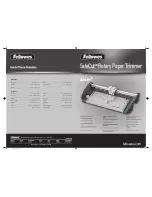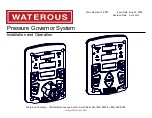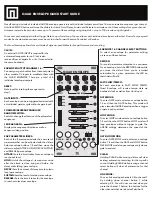
mode. This mode will override both the medium and low
priority modes. This input must be fused (1-ampere) at the
source.
4. Low Power Input
Applying 12 VDC to the grey/white/red 22
AWG wire in the control cable will cause the strobes to
flash at approximately one half power. This input must be
fused (1-ampere) at the source.
NOTE
For eight, ten and twelve head models front or rear
cutoff can be implemented by removing 12 VDC
from the 12 AWG red (front) or 12 AWG white/red
(rear) wires.
D.
Programming.
1. Flash Pattern.
The flash pattern assigned to a priority control
input can be change by applying 12 VDC to the desired
priority input, then applying 12 VDC to the blue/white/red
wire will advance the pattern to the next available pattern.
To advance the pattern selection, 12 VDC must be removed
from the blue/white/red wire and re-applied. Repeat the
above until the desired pattern is selected. When 12 VDC is
removed from the priority input, the pattern selection will
be stored in memory. Listed below are the available pat-
terns:
a. Null (no flash)
b. Action
c. ModQuad
d. Sweep
e. Random
f. RicoFlash
g. Triple
h. Triple-2
i. Double
j. Double-2
k. Combo
2. Head Select.
The number of head pairs (A/B, C/D and E/F)
that operate when a priority control input is selected can
be changed by applying 12 VDC to the desired priority
input, then applying 12 VDC to the black/white/red wire
will advance to the next available combination of head pair
operation. To advance to the next available combination,
12 VDC must be removed from the black/white/red wire
and re-applied. When 12 VDC is removed from the priority
input, the head pair combination will be stored in memory.
Listed below are the available head pair combinations:
a. A/B, C/D & E/F
b. A/B & C/D
c. A/B & E/F
d. C/D & EF
e. A/B
f. C/D
g. E/F
E.
Function Activation - Lower Level LED’s.
1. Front LED’s/Flasher.
To activate front LED flasher apply 12VDC to the
Blue wire. See figure 1 for proper fusing.
2. Rear LED’s/Flasher.
To activate rear LED flasher apply 12VDC to
the Violet wire. See figure 1 for proper fusing.
3. Backup Operation.
To activate the backup activation for both
front and rear LED flashers apply 12VDC to the WHT/VIO
wire. See figure 1 for proper fusing.
F.
Function Activation – Man Down Blue LED
Module.
1. Activation.
Apply 12VDC to the Gray wire. See figure 1
for proper fusing.
2. Intensity Adjustment.
Remove upper center dome. Apply 12VDC
to the Gray wire. Locate the Man Down/Backup Feed cir-
cuit board. Adjust potentiometer R1 clockwise to increase
intensity and counter-clockwise to decrease intensity.
Remove 12VDC and reinstall center dome.
III. BASIC MAINTENANCE.
High voltages are present inside the lightbar.
Wait at least ten (10) minutes, after shutting
off power, before servicing this unit. Failure
to do so may result in property damage, seri-
ous injury, or death to you or others.
Disconnect ALL power to the lightbar before
any maintenance is performed.
A.
Cleaning the Plastic Domes.
Ordinary cleaning of the plastic domes can be
accomplished by using mild soap and a soft rag. Should fine
scratches or a haze appear on the domes, they can ordinar-
ily be removed with a non-abrasive, high quality automo-
tive paste wax.
Crazing (cracking) of domes will cause re-
duced effectiveness of light system. Do not
use cleaning agents (which will cause craz-
ing) such as strong detergents, solvents, or
petroleum products. If crazing of domes does
occur, reliability of light for emergency warn-
ing purposes may be reduced until domes are
replaced.
-4-
























